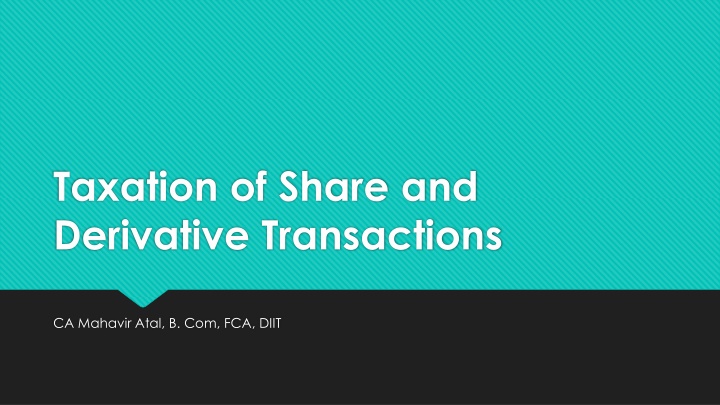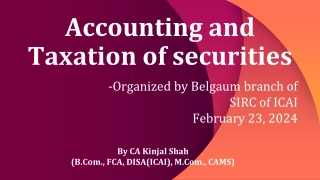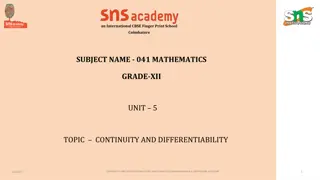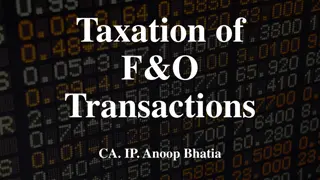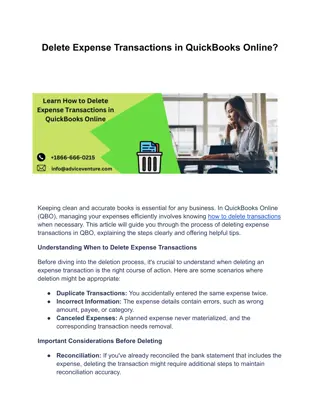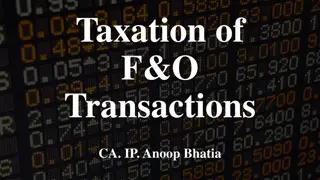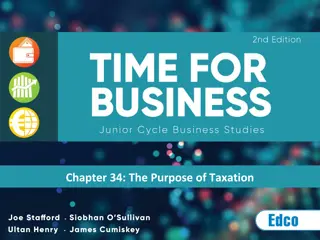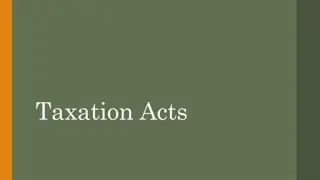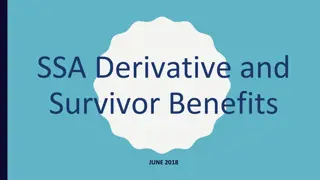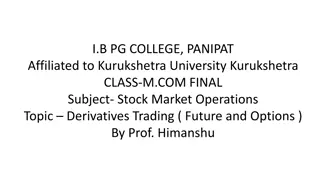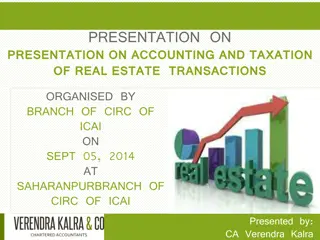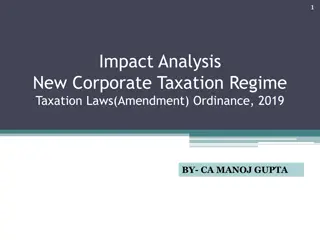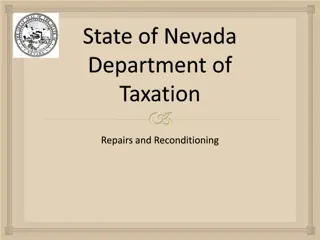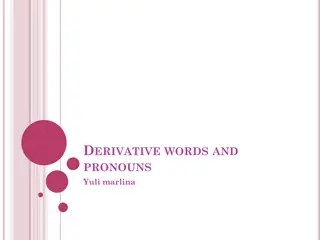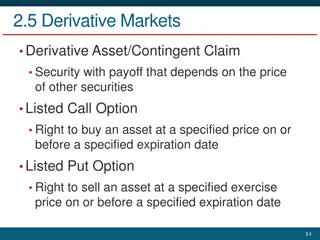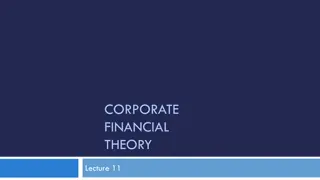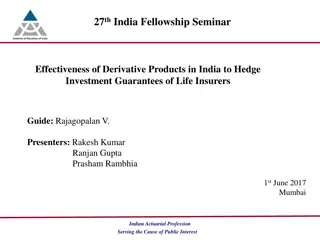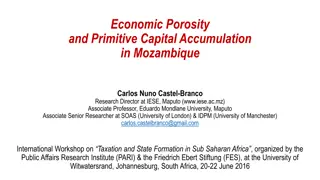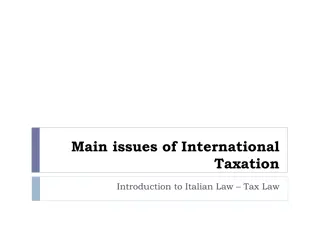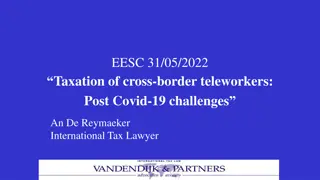Taxation Guidelines for Share and Derivative Transactions by CA Mahavir Atal
Guidelines by CA Mahavir Atal regarding taxation of share and derivative transactions, including determining business income vs. capital gain, treatment of shares as stock-in-trade, maintaining separate portfolios, and the classification of transactions as either business or investment. The circulars provide insights on holding periods, treating income from share transfers as business income or capital gains, and defining speculative transactions.
Download Presentation

Please find below an Image/Link to download the presentation.
The content on the website is provided AS IS for your information and personal use only. It may not be sold, licensed, or shared on other websites without obtaining consent from the author.If you encounter any issues during the download, it is possible that the publisher has removed the file from their server.
You are allowed to download the files provided on this website for personal or commercial use, subject to the condition that they are used lawfully. All files are the property of their respective owners.
The content on the website is provided AS IS for your information and personal use only. It may not be sold, licensed, or shared on other websites without obtaining consent from the author.
E N D
Presentation Transcript
Taxation of Share and Derivative Transactions CA Mahavir Atal, B. Com, FCA, DIIT
Guidelines for AO to determine business income or capital gain As per CBDT circular No. 4/2007, Dated 15-6-2007 1. Whether the shares purchased were held and valued as stock-in-trade. 2. Whether there were substantial transactions. In this context, the magnitude of the transactions, ratio between purchases and sales, entries in the books of account; will be relevant. 3. Whether the object of investment in shares was to derive income by way of dividends or realizing profits by the purchase and sale thereof. 4. The CBDT advises that a tax payer may have to maintain two portfolios viz. (i) The investment portfolio comprising securities which are to be treated as capital assets; and (ii) Trading portfolios comprising stock-in-trade which are to be treated as trading assets.
Transaction in shares Business or investment As per CBDT circular no. 6/2016 dated 29-2-2016 Where the assessee himself, irrespective of the period of holding of listed shares and securities, opts to treat them as stock-in-trade, the income arising from transfer of such shares/ securities would be treated as a business income. In respect of listed shares and securities held for a period of more than 12 months immediately preceding the date of its transfer if the assessee desires to treat such income on sale of Shares as Capital Gains the same shall not be put to dispute by the Income Tax Officer. In other words, the assessee is allowed to treat shares which were held for more than 12 months as Long Term Capital Gains. However, this stand, once taken by the assessee in a particular assessment year shall remain applicable in subsequent assessment years also and the taxpayer shall not be allowed to adopt a different/ contrary stand in subsequent assessment years.
Section 43(5) (5) "speculative transaction" means a transaction in which a contract for the purchase or sale of any commodity, including stocks and shares, is periodically or ultimately settled otherwise than by the actual delivery or transfer of the commodity or scrips: Provided that for the purposes of this clause (a) a contract in respect of raw materials or merchandise entered into by a person in the course of his manufacturing or merchanting business to guard against loss through future price fluctuations in respect of his contracts for actual delivery of goods manufactured by him or merchandise sold by him; or (b) a contract in respect of stocks and shares entered into by a dealer or investor therein to guard against loss in his holdings of stocks and shares through price fluctuations; or
Section 43(5) (c) a contract entered into by a member of a forward market or a stock exchange in the course of any transaction in the nature of jobbing or arbitrage to guard against loss which may arise in the ordinary course of his business as such member; or (d) an eligible transaction in respect of trading in derivatives referred to in clause (ac) of section 2 of the Securities Contracts (Regulation) Act, 1956 (42 of 1956) carried out in a recognised stock exchange; or (e) an eligible transaction in respect of trading in commodity derivatives carried out in a 78[recognised stock exchange], which is chargeable to commodities transaction tax under Chapter VII of the Finance Act, 2013 (17 of 2013), shall not be deemed to be a speculative transaction:
Section 43(5) Following stock exchanges are notified as recognized stock exchanges for trading in derivatives by CBDT. 1. NSE & BSE 2. MCX Stock Exchange 3. United Stock Exchange of India Ltd 4. India International Exchange (IFSC Ltd) For Commodities 1. NCDEX 2. MCX 3. Universal Commodity Exchange Ltd 4. Ace derivaties & Commodity Exchange Ltd 5. Indian Commodity Exchange Ltd 6. National Stock Exchange Ltd
Tax rates for different securities 1. Equity Shares & Equity Oriented Mutual Funds Period of Holding Up to 12 months Short term/long term Short Term Tax Rate 15% 10% (Without Indexation) Exceeding Rs. 1 Lakhs More than 12 months Long Term 2. Unlisted Equity Shares Period of Holding Up to 24 months More than 24 months Short term/long term Short Term Long Term Tax Rate Normal/ slab rates 20%
Tax rates for different securities 3. Listed Bonds/ Debentures Period of Holding Up to 12 months More than 12 months Short term/long term Short Term Long Term Tax Rate Normal/ slab rates 10% (Without Indexation) 4. Unlisted Bonds/ Debentures Period of Holding Up to 36 months More than 36 months Short term/long term Short Term Long Term Tax Rate Normal/ slab rates 20% without indexation
Tax rates for different securities 5. Zero Coupon Bonds Period of Holding Up to 12 months Short term/long term Short Term Tax Rate Normal/ slab rates 20% (With indecxation) 10% (Without Indexation) More than 12 months Long Term
Determination of Turnover in F&O cases The method for determination of turnover is not provided under the Income Tax Act, 1961. However, as per generally accepted accounting practice and as per ICAI Guidance Note on Tax Audit, it should be as follows: The total of favourable and unfavourable differences (Profit/Loss) shall be taken as turnover (In other words, all the differences, whether positive or negative are aggregated for calculating the turnover). Premium received on sale of options is also to be included in turnover. In respect of any reverse trades entered, the difference thereon, should also form part of the turnover Examples of the calculations are provided in the next slide.
Determination of Turnover in F&O cases Example 1 -
Determination of Turnover in F&O cases Example 2 -
Section 44AA 44AA. (1) Every person carrying on legal, medical, engineering or architectural profession or the profession of accountancy or technical consultancy or interior decoration or any other profession as is notified by the Board in the Official Gazette shall keep and maintain such books of account and other documents as may enable the Assessing Officer to compute his total income in accordance with the provisions of this Act. (2) Every person carrying on business or profession [not being a profession referred to in sub-section (1)] shall, (i) if his income from business or profession exceeds [one lakh twenty] thousand rupees or his total sales, turnover or gross receipts, as the case may be, in business or profession exceed or exceeds [ten lakh] rupees in any one of the three years immediately preceding the previous year; or (ii) where the business or profession is newly set up in any previous year, if his income from business or profession is likely to exceed [one lakh twenty] thousand rupees or
Section 44AA (iii) where the profits and gains from the business are deemed to be the profits and gains of the assessee under [section 44AE] 40 [or section 44BB or section 44BBB], as the case may be, and the assessee has claimed his income to be lower than the profits or gains so deemed to be the profits and gains of his business, as the case may be, during such [previous year; or]] (iv) where the provisions of sub-section (4) of section 44AD are applicable in his case and his income exceeds the maximum amount which is not chargeable to income-tax in any previous year,] keep and maintain such books of account and other documents as may enable the 43[Assessing] Officer to compute his total income in accordance with the provisions of this Act.
Section 44AA Provided that in the case of a person being an individual or a Hindu undivided family, the provisions of clause (i) and clause (ii) shall have effect, as if for the words "one lakh twenty thousand rupees", the words "two lakh fifty thousand rupees" had been substituted : Provided further that in the case of a person being an individual or a Hindu undivided family, the provisions of clause (i) and clause (ii) shall have effect, as if for the words "ten lakh rupees", the words "twenty-five lakh rupees" had been substituted. (3) The Board may, having regard to the nature of the business or profession carried on by any class of persons, prescribe5, by rules, the books of account and other documents (including inventories, wherever necessary) to be kept and maintained under sub-section (1) or sub-section (2), the particulars to be contained therein and the form and the manner in which and the place at which they shall be kept and maintained.
Section 44AB 44AB. 48Every person, (a) carrying on business shall, if his total sales, turnover or gross receipts, as the case may be, in business exceed or exceeds [one crore rupees] in any previous year [Provided that in the case of a person whose (a) turnover or gross receipts during the previous year, in cash, does not exceed five per cent of the said amount; and aggregate of all amounts received including amount received for sales, (b) aggregate of all payments made including amount incurred for expenditure, in cash, during the previous year does not exceed five per cent of the said payment: this clause shall have effect as if for the words "one crore rupees", the words [ten]crore rupees" had been substituted; or]
Section 44AB (b) carrying on profession shall, if his gross receipts in profession exceed [fifty] lakh rupees] in any [Provided further that for the purposes of this clause, the payment or receipt, as the case may be, by a cheque drawn on a bank or by a bank draft, which is not account payee, shall be deemed to be the payment or receipt, as the case may be, in cash, ] 56[previous year; or (c) carrying on the business shall, if the profits and gains from the business are deemed to be the profits and gains of such person under [ section 44AE ] [or section 44BB or section 44BBB], as the case may be, and he has claimed his income to be lower than the profits or gains so deemed to be the profits and gains of his business, as the case may be, in any [previous year; or]]
Section 44AB (d) carrying on the [profession] shall, if the profits and gains from the [profession] are deemed to be the profits and gains of such person under [ section 44ADA] and he has claimed such income to be lower than the profits and gains so deemed to be the profits and gains of his [profession] and his income exceeds the maximum amount which is not chargeable to income-tax in any [previous year; or] [(e) carrying on the business shall, if the provisions of sub- section (4) of section 44AD are applicable in his case and his income exceeds the maximum amount which is not chargeable to income-tax in any previous year,] get his accounts of such previous audited by an accountant before the specified date and [furnish by] that date the report of such audit in the prescribed form duly signed and verified by such accountant and setting forth such particulars as may be prescribed.
Section 44AB Provided that this section shall not apply to the person, who declares profits and gains for the previous year in accordance with the provisions of sub-section (1) of section 44AD and his total sales, turnover or gross receipts, as the case may be, in business does not exceed two crore rupees in such previous year: Provided further that this section shall not apply to the person, who derives income of the nature referred to in section 44B or section 44BBA, on and from the 1st day of April, 1985 or, as the case may be, the date on which the relevant section came into force, whichever is later :
Section 44AD 44AD. (1) Notwithstanding anything to the contrary contained in sections 28 to 43C, in the case of an eligible assessee engaged in an eligible business, a sum equal to eight per cent of the total turnover or gross receipts of the assessee in the previous year on account of such business or, as the case may be, a sum higher than the aforesaid sum claimed to have been earned by the eligible assessee, shall be deemed to be the profits and gains of such business chargeable to tax under the head "Profits and gains of business or profession" : Provided that this sub-section shall have effect as if for the words "eight per cent", the words "six per cent" had been substituted, in respect of the amount of total turnover or gross receipts which is received by an account payee cheque or an account payee bank draft or use of electronic clearing system through a bank account [or through such other electronic mode as may be prescribed] during the previous year or before the due date specified in sub-section (1) of section 139 in respect of that previous year.
Section 44AD (2) Any deduction allowable under the provisions of sections 30 to 38 shall, for the purposes of sub-section (1), be deemed to have been already given full effect to and no further deduction under those sections shall be allowed. (3) The written down value of any asset of an eligible business shall be deemed to have been calculated as if the eligible assessee had claimed and had been actually allowed the deduction in respect of the depreciation for each of the relevant assessment years. (4) Where an eligible assessee declares profit for any previous year in accordance with the provisions of this section and he declares profit for any of the five assessment years relevant to the previous year succeeding such previous year not in accordance with the provisions of sub-section (1), he shall not be eligible to claim the benefit of the provisions of this section for five assessment years subsequent to the assessment year relevant to the previous year in which the profit has not been declared in accordance with the provisions of sub-section (1).
Section 44AD (5) Notwithstanding anything contained in the foregoing provisions of this section, an eligible assessee to whom the provisions of sub-section (4) are applicable and whose total income exceeds the maximum amount which is not chargeable to income-tax, shall be required to keep and maintain such books of account and other documents as required under sub-section (2) of section 44AA and get them audited and furnish a report of such audit as required under section 44AB. (6) The provisions of this section, notwithstanding anything contained in the foregoing provisions, shall not apply to (i) a person carrying on profession as referred to in sub-section (1) of section 44AA; (ii) a person earning income in the nature of commission or brokerage; or (iii) a person carrying on any agency business.
Section 44AD Explanation. For the purposes of this section, (a) "eligible assessee" means, (i) an individual, Hindu undivided family or a partnership firm, who is a resident, but not a limited liability partnership firm as defined under clause (n) of sub-section (1) of section 2 of the Limited Liability Partnership Act, 2008 (6 of 2009); and (ii) who has not claimed deduction under any of the sections 10A, 10AA, 10B, 10BA or deduction under any provisions of Chapter VIA under the heading "C. - Deductions in respect of certain incomes" in the relevant assessment year; (b) "eligible business" means, (i) any business except the business of plying, hiring or leasing goods carriages referred to in section 44AE; and (ii) whose total turnover or gross receipts in the previous year does not exceed an amount of two crore rupees.
Section 44ADA 44ADA. (1) Notwithstanding anything contained in sections 28 to 43C, 14[in case of an assessee, being an individual or a partnership firm other than a limited liability partnership as defined under clause (n) of sub-section (1) of section 2 of the Limited Liability Partnership Act, 2008 (6 of 2009), who is a resident in India, and] is engaged in a profession referred to in sub-section (1) of section 44AA and whose total gross receipts do not exceed fifty lakh rupees in a previous year, a sum equal to fifty per cent of the total gross receipts of the assessee in the previous year on account of such profession or, as the case may be, a sum higher than the aforesaid sum claimed to have been earned by the assessee, shall be deemed to be the profits and gains of such profession chargeable to tax under the head "Profits and gains of business or profession". (2) Any deduction allowable under the provisions of sections 30 to 38 shall, for the purposes of sub- section (1), be deemed to have been already given full effect to and no further deduction under those sections shall be allowed.
Section 73 73. (1) Any loss, computed in respect of a speculation business carried on by the assessee, shall not be set off except against profits and gains, if any, of another speculation business. (2) Where for any assessment year any loss computed in respect of a speculation business has not been wholly set off under sub-section (1), so much of the loss as is not so set off or the whole loss where the assessee had no income from any other speculation business, shall, subject to the other provisions of this Chapter, be carried forward to the following assessment year, and (i) it shall be set off against the profits and gains, if any, of any speculation business carried on by him assessable for that assessment year; and (ii) if the loss cannot be wholly so set off, the amount of loss not so set off shall be carried forward to the following assessment year and so on.
Section 73 (3) In respect of allowance on account of depreciation or capital expenditure on scientific research, the provisions of sub-section (2) of section 72 shall apply in relation to speculation business as they apply in relation to any other business. (4) No loss shall be carried forward under this section for more than four assessment years immediately succeeding the assessment year for which the loss was first computed. Explanation. Where any part of the business of a company (other than a company whose gross total income consists mainly of income which is chargeable under the heads "Interest on securities", "Income from house property", "Capital gains" and "Income from other sources", or a company the principal business of which is the business of trading in shares or banking] or the granting of loans and advances) consists in the purchase and sale of shares of other companies, such company shall, for the purposes of this section, be deemed to be carrying on a speculation business to the extent to which the business consists of the purchase and sale of such shares.
Illustrations Question 1 - Mr X started trading in F&O for the first time during FY 2020-21. Turnover during the year is 75 lacs and he made a loss of 2 lacs. Question 2 - Mr X started trading in F&O for the first time during FY 2020-21. Turnover during the year is 4 crores and he made a loss of 20 lacs.
Illustrations Question 3 - Mr X started trading in F&O for the first time during FY 2020-21. Turnover during the year is 12 crores and he made a profit of 10 lacs. Question 4 - Mr X started trading in F&O for the first time during FY 2019-20 and declared profit at the presumptive rate of 8%/6% as applicable (for F&O traders it is generally 6%). During the year 2020-21 turnover from F&O trading was 10 lacs and he incurred a loss of 2 lacs and Mr X does not have any other income during the year. Mr. X wants to declare and claim the loss of 2 lacs. It will have the following implications:
Illustrations Question 5 - Same facts as discussed in Example 4 except that Mr X has income of 10 lacs during the year.
